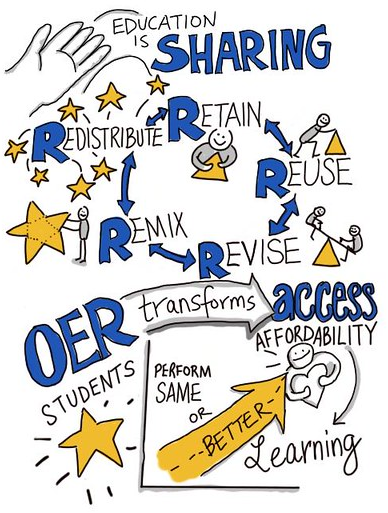What does 'open' really mean?
13 Nov 2020 { open education definitions }‘Open’ has many interconnected meanings - let’s bring some of them to the surface
I’ll use the word ‘open’ frequently in this blog series, so it’s worth clarifying what I mean before I dive more deeply into the implications of working openly. Here are some relevant examples:
- Open source software - software for which anyone can view the code, replicate it, and/or contribute to improving it.
- Open educational practice - many definitions exist, but I favour a focus on inclusive collaborations between educators to design curricula that use and promote Open Educational Resources (OER)
- Working in the open - operating in a transparent fashion, as in the ‘open startup’ movement where companies choose to share key business metrics, salary schemes, or business decisions publically
Openness denotes being free, but the word ‘free’ in English is in itself ambiguous; it means both given away for nothing, or being able to do what you want. The French language distinguishes between these two concepts with the words ‘gratis’ and ‘libre’. Gratis indicates ‘without payment’. Libre comes from the same etymological root as liberation, and means ‘without restrictions or limits’; “free as in free speech, not free beer”.
When I use the word ‘open’ in the context of education or technology, I’m referring to libre, not gratis. Of course, being able to give something away for nothing is itself a form of freedom! I am developing a business model that enables me to release learning materials to study without paying (gratis), but I’m more interested in the consequences of making courses free for both learners and educators to share, re-use and improve (libre).
http://www.opencontent.org lists five rights for a work to be considered truly open:
- Retain - the right to have your own copy
- Revise - the right to modify your copy
- Remix - the right to combine your original or revised copy with other work
- Reuse - the right to use your original, revised or remixed copy publically
- Redistribute - the right to share your original, revised or remixed copy with others
This would be analogous to not just owning a copy of your favourite book, but being able to write your own ending, weave in chapters from another book you love, podcast yourself reading aloud from it, and give copies away to friends.
Choosing an appropriate licence for openly-released content helps to enforce these user rights, but choosing the ‘best’ licence is a surprisingly complex and thorny topic, and one to which I’ll return in the future.
This definition of open content is the gold standard to which I aspire, but I aim to be open beyond simply releasing open content. For example, I’m writing openly about my thoughts and journey in order to start conversations about these issues, and how they relate to tackling the biodiversity and climate crises. I also want to be transparent about how openness is an important motivator for me, and influences my business decisions.
Further reading
Wikipedia on Gratis versus Libre
Wikipedia on Open Educational Practices
-
Extract from “OER is sharing” by giulia.forsythe CC0 1.0 ↩
